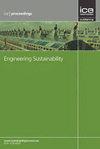工业化建筑中的资源效率因素——对发展中经济体的研究
IF 1.5
4区 工程技术
Q3 ENGINEERING, CIVIL
Proceedings of the Institution of Civil Engineers-Engineering Sustainability
Pub Date : 2023-01-26
DOI:10.1680/jensu.22.00048
引用次数: 0
摘要
发展中经济体需要提供住房,并在此过程中确保资源效率。工业化建筑提高了建筑的生产率,可以成为提供所需住房的一种手段。然而,对发展中经济体工业化建筑的资源效率研究不足。本文从价值链和环境影响的角度研究了埃塞俄比亚亚的斯亚贝巴工业化住房产品资源效率的影响因素;肯尼亚内罗毕;以及南非的开普敦。具体来说,研究了不同程度工业化建筑实施的墙体系统。该研究揭示了四个主要的见解:首先,材料的选择影响工业化墙壁系统的资源效率。然而,目前的价值链并没有促进新材料的采用。其次,用于工业化墙面系统的产品是进口的,会产生额外的运输相关影响。第三,工业化建筑墙体系统通常使用轻质材料,具有拆卸的潜力。然而,最终用户对这种设计策略持保留态度。第四,墙体系统的受控生产减少了建筑垃圾,提高了产品质量。然而,各国政府目前正在推广劳动密集型的建筑方法。基于这些见解,本文总结了利益相关者在工业化建筑采用中提高资源效率的建议、杠杆和行动点。本文章由计算机程序翻译,如有差异,请以英文原文为准。
Resource efficiency factors in industrialised construction – a study in developing economies
Developing economies need to supply housing and ensure resource efficiency in the process. Industrialised construction, which increases productivity in construction, can be one means to deliver the needed housing. However, the resource efficiency of industrialised construction in developing economies is under-researched. This paper studies factors influencing resource efficiency in industrialised housing products from a perspective of value chain and environmental impact in Addis Ababa, Ethiopia; Nairobi, Kenya; and Cape Town, South Africa. Specifically, wall systems with varying degrees of industrialised construction implementation are studied. The study uncovers four main insights—first, the choice of materials influences the resource-efficiency of industrialised wall systems. However, the current value chain does not promote the adoption of new materials. Second, products used for industrialised wall systems are imported and incur added transportation-related impacts and beyond. Third, industrialised construction wall systems often use lightweight materials and have the potential for disassembly. However, end-users have reservations about such design strategies. Fourth, controlled production of wall systems reduces construction waste and increases the quality of products. Nevertheless, governments are currently promoting labour-intensive construction methods. Based on these insights, the paper concludes with recommendations, levers, and action points for stakeholders to promote resource efficiency in industrialised construction adoption.
求助全文
通过发布文献求助,成功后即可免费获取论文全文。
去求助
来源期刊

Proceedings of the Institution of Civil Engineers-Engineering Sustainability
ENGINEERING, CIVIL-ENGINEERING, CIVIL
CiteScore
3.70
自引率
16.70%
发文量
44
审稿时长
>12 weeks
期刊介绍:
Engineering Sustainability provides a forum for sharing the latest thinking from research and practice, and increasingly is presenting the ''how to'' of engineering a resilient future. The journal features refereed papers and shorter articles relating to the pursuit and implementation of sustainability principles through engineering planning, design and application. The tensions between and integration of social, economic and environmental considerations within such schemes are of particular relevance. Methodologies for assessing sustainability, policy issues, education and corporate responsibility will also be included. The aims will be met primarily by providing papers and briefing notes (including case histories and best practice guidance) of use to decision-makers, practitioners, researchers and students.
 求助内容:
求助内容: 应助结果提醒方式:
应助结果提醒方式:


